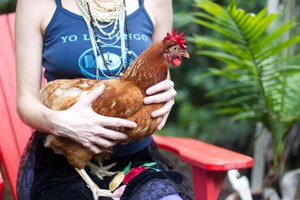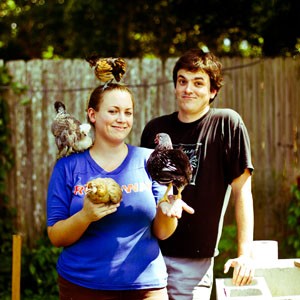If there were such a thing as a Garden of Eden for chickens, it would be this backyard in downtown Orlando. In a neighborhood not far from the city center, better known for its bars and dining than for its rural charms, two little red hens have it made. They scratch about in a yard nicer than ones some kids play in, pecking at the dust under blooming magnolias, palm fronds and paper lanterns strung about for ambience.
The only real signs that this backyard is a home for the hens are the corncobs scattered about and the little shabby-chic chicken coop that sits in ;the corner.
Two chickens, each the size of a basketball ;covered in feathers, cluck softly and scratch around while their owner, a marketing representative for a beverage company, talks to them and feeds ;them raisins.
"I don't want my name or address in this story because it's totally illegal having chickens," she warns before agreeing to talk about her pets. "I don't want someone down the street who wants to be an asshole to be like, ‘Oh, that's the girl who lives down the street from me,' and turn me in."
Indeed, that's a risk that chicken owners in Orlando take because, innocuous as it may seem to those who love the birds, keeping chickens in residential areas of the city ;violates zoning code.
City spokeswoman Cassandra Lafser can't say how many people the city has cracked down on for owning chickens – "It's not like we actively go looking for them," she says – but if someone is caught owning an illegal chicken in the city, the penalties aren't minor. The city can tell you to get rid of the birds and hit you with fines of $1,000 per day if you refuse ;to comply.
For people like this downtown chicken keeper – we'll call her Joan for the purposes of this story – who says her chickens aren't just barnyard animals, but pampered pets, this creates a great deal of anxiety. Joan originally got her chickens because she thought they'd be a good investment. Over time she says she's "bonded" with the birds, which she calls "the girls," and says she loves them like most people love their dogs or cats.
She shares a photo of herself and one of her chickens: She's wearing a long, green evening dress. Her chicken is perched on her bed, wearing a rainbow-colored chicken "diaper" to keep it from soiling indoors. She's using the photo to have a portrait painted of herself and the hen, which she has named Marchesa McNuggets.
Joan says one of her hens used to go for walks with her around the neighborhood,; but not anymore.
"I would walk down the road with her perched on my shoulder while I was walking my dog," she says. She stopped when she started drawing too much attention. "I was afraid. I felt like somebody might tell on me."
Joan is not an anomaly. She's one of a growing number of people in urban and suburban areas who are keeping chickens in their backyards. They build them special coops to live in. They dote on them, coddle them and feed them special diets. Sometimes they let them come into their houses – a practice that's best accompanied by the use of specially made chicken diapers.
"It's like a little cloth pouch, attached to the chicken like suspenders," says Joan, who sometimes lets her chickens run around indoors. "You put a little baggie in the pouch under their bum, and it catches the poop. A lot of people think it's gross, but it's not grosser than picking up dog poop every day or changing a kid's diaper."
Chicken coops ranging from the mundane (homemade wood-and-wire cages) to the modish (modern minimalist coops called Eglus) are turning up in even densely populated cities like New York and San Francisco, where raising poultry as pets is legal. In Chicago, residents can keep chickens as long as they are being raised for eggs, rather than slaughter. In Baltimore, it's legal to keep up to four hens as long as they're located at least 25 feet from the nearest residence.
The activity has been written up in newspapers and magazines ranging from the New Yorker ("The It Bird," Sept. 28, 2009) to the Wall Street Journal ("Fowl Fans See Golden Eggs in Catering to Pet-Chicken Market, July 8), which have declared pet poultry a booming business fueled by the locavore penchant for eating local and remaining close to the source of one's food.
Some Orlandoans are also getting in on the chicken-keeping action, though the city has not acknowledged the trend. Chickens are only permitted in agricultural zones in the city, and even then, they must be kept at least 100 feet away from a residence. Over the years, the city has asked a handful of residents who were keeping chickens (and in one instance, according to a 2000 Orlando Sentinel story, two pigs as well) to remove them. And per Lafser, to date there's been no attempt to make zoning codes more chicken-friendly.
Which chaffs chicken lovers like Joan, who says she lives in fear that someone will complain and "the girls" could be taken away from her.
"At this point," she says, "getting rid of them would be like somebody coming to your house and saying, ‘Sorry but Orlando has an ordinance against Labrador retrievers. You've got to get rid of your lab. It would be the same trauma."
;;There is no one in charge of keeping track of the number of chickens being raised in the United States; not even the United States Department of Agriculture's Alternative Farming Systems Information Center, which keeps a resource library full of statistics on sustainable and alternative agricultural practices, has taken a chicken census yet, though it is working on one for four cities this year. The results, the USDA says, will help the agency estimate just how many backyard chickens are being kept in cities around the nation.
Keeping chickens, even in urban areas, was a relatively normal practice until roughly the 1950s. Before that, chickens – cheap, hardy, tolerant and suitable for small spaces – were ubiquitous. Eggs could be collected from the hens, which lay regularly for the first two years of their lives, then they could be slaughtered and cooked.
Chickens began to lose their popularity among city dwellers as life for families became more modern and the conveniences of frozen dinners and fluorescent-lit supermarkets -made it possible for people to obtain food cheaply, easily and quickly without the labor.
Those who cater to the backyard-chicken industry say the birds are in vogue once again, though. They say they're seeing people who may never have considered chickens a decade ago express interest in keeping them – both as pets and as food producers.
Bud Wood is president of McMurray Hatchery, the largest rare-breed hatchery in the United States. In 2009, his company sold more than 1.7 million chickens, from fluffy chicks to hens ready to lay.
Business hasn't always been that good. Wood says that over the past several years, "We have been running at full capacity." He says the hatchery, founded in 1917, used to primarily supply family farms with chickens, sold in lots of 100 chicks. In the 1970s and '80s, the number of family farms dwindled, so McMurray started offering chickens in smaller quantities – 25 chicks to a box – and targeted the backyard farmer. Used to be, he says, the company might sell out and have to put orders on hold for one week. Now, he says, it's normal for customers to wait many more weeks to get their stock.
"We have a backlog," he says. "At the peak of the season, we were probably anywhere from four to six weeks out before we could fill your order. In prior years, we probably sold out maybe a week ahead of time. In the last few years, we sell out weeks ahead. This year is not quite as strong as the year before, but it's still a very strong year."
When asked if he thinks the popularity of chickens is trending up, Wood's answer is an unequivocal yes.
He says that it's become more common for people living in cities and suburbs to order from McMurray, which is located in Webster City, Iowa. Since it's not practical in most cities (and in many cases, not legal) to keep flocks of 25 chickens in a single small yard, he says, friends and neighbors are placing orders together.
"The other day I had a person send me a Craigslist ad, posting that people were asking if anyone wanted to split an order from McMurray Hatchery," he says. "I see those kinds of things going on more often now."
;Farmers now make up less than 1 percent of the U.S. population, according to USDA statistics from 2007. As a result, the food on our plates increasingly comes from factory farms, where crops are dusted with pesticides and livestock are treated with antibiotics and chemicals that keep them healthy in stressful, cramped pens. As the conditions under which food is produced have been revealed to the public (a lot of the credit for this goes to Michael Pollan's 2006 book Omnivore's Dilemma, which traced the journey of food from farm to supermarket to plate), a growing number of Americans have embraced alternatives: organic meats and produce, hormone-free dairy products, backyard gardening. Over the last few years locavorism – the practice of eating food grown or raised within a 100-mile radius of where you live – has exploded.
Wood thinks this is why people are turning to chickens. Goats, cows and sheep are big, expensive and impractical; chickens are portable and – save for the roosters – quiet. People get them because they like to know where their food is coming from.
"They want to know it's raised naturally," he says, "that it doesn't have any chemicals or other stuff in it. I think chickens just follow along with that."
That's one of the reasons Joan originally decided to raise city chickens.
"I thought it would be a good investment," she says. "I am a vegetarian, but I eat eggs, and I really wanted my own fresh eggs. I eat an egg every morning, so I thought how wonderful it would be to know that egg was laid by a creature that was comfortable and loved and had a great diet."
Hens produce fresh eggs on an almost-daily basis, particularly in warm weather, and chickens can produce 45 pounds of fertilizer per year in the form of manure that can be used for composting or backyard gardens. It's a return on investment that few other pets kept in city environments can match. Plus, chickens are cheap to feed. A 50-pound bag of organic feed costs about $30 and can last four or five months, depending on the number of birds feasting on the stuff. Non-organic feeds cost about half that.
Joan brought her birds home from Palmer Feed Store near the corner of Church Street and Parramore Avenue, not far from downtown. They were little then, about the size of pigeons, so she raised them in a dog crate until they were big enough to go outside. She cuddled and coddled them, and eventually she also fell for them. Now they're not only residents of her backyard, they're also regulars at her parties.
"I love to entertain and have people over for drinks, and it's kind of a parlor trick," she says. "You bring the chicken in; it's sort of an interesting thing for people. Everyone who wants to pet the chicken can pet the chicken. To me, it's kind of funny. And I don't mean that at all at the expense of the chickens."
Although some urban chicken keepers are drawn to unusual companionship of the novelty pets – something that cannot be understated; a Wall Street Journal article from July 8 profiled the pet-chicken industry and the money to be made in everything from diapers for house chickens to "treat ball" toys for chickens to peck at – plenty are more philosophical about their hobby flocks.
Matt De Vlieger and his roommate, Greg Leibowitz, got chickens because they wanted something practical out of their pets; chickens provide eggs and thus figured well into their sustainable living ethos.
The two now keep four hens in their Orlando backyard. The chickens, purchased from Palmers Feed, live in a coop in the backyard made out of a converted rabbit cage.
"Generally speaking, Americans are kept in the dark as to where our food comes from," says De Vlieger. "Not to mention how many times and where it was processed before it gets to us. That's why we keep chickens."
When an egg comes from a commercial farm, there's little chance the bird was scratching about and scouting freely for grubs and flies. Even feel-good terms for eggs, like "cage free" and "free range," are no guarantee the birds that produced them were raised in healthy, natural conditions. Cage-free birds may not be isolated to small, individual chambers, but they might be raised in overcrowded barns with barely enough room to shuffle about, much less scratch around freely.
In a January 2003 report on humane farming and price justification, Consumer Reports described the conditions at one farm it toured: "When we visited one free-range chicken farm a few years ago, we found a penned, 10x30-foot patch of dirt topped with chicken manure."
Most free-range chickens are debeaked, as well, which means the top portion of a chicken's beak is removed to keep them from harming one another in crowded barns and yards.
So for some, like De Vlieger and Leibowitz, keeping chickens is not just about better food choices but also about finding a way around supporting commercial agriculture.
"Imagine if you had the opportunity to create or harness your own electric energy to power your home or car, without the need for fossil fuels," says De Vlieger. "If you could, you probably wouldn't want to go out and buy expensive gas and oil and coal just to keep the oil industry cushy, when you could otherwise do it yourself and take pride in it."
When Melody Johnson and Jarrod Holloway sat down to lunch a few months ago, Holloway suggested on a whim that they buy a few chickens.
Unaware of the city's zoning laws, the couple purchased three hen chicks from Palmer: two Ameraucana and a Wyandotte.
"We'd seen chickens running loose around Lake Davis, so we didn't think anything of the law," says Holloway. "Whether it was illegal or not was the last thing on our minds."
Not until Johnson's mother questioned the legality of the chickens did they ;think to check.
"It seems like as long as you don't have a rooster that crows nonstop, it wouldn't be much of an issue to have chickens, as long as they're contained," says Holloway.
Since then, they acquired two more chickens, both exotic breeds: a Golden Laced Polish named Rose and a Sultan named Dorothy.
"They're going to look so cool when they get older," says Johnson, who dotes on her teenage chicks. "Rose caught her first bug today. She's getting really good at it."
Like Joan, they originally got the chickens for practical purposes, but they've grown attached to their feathered friends.
"The main reason we decided to have chickens in the first place was for the eggs," says Johnson. "Now, if the chickens didn't lay eggs, we'd probably still have them. They have such personality, and they're very easy to take care of. They might be the ;perfect pet."
Not to everybody, though. In places where people complain about chickens, rather than champion them, the burgeoning chicken-keeping trend is not a popular one. In the city of St. Cloud, an effort was made this summer to revisit the city's ban on chicken-keeping, enacted in 1989. On July 8, the city council voted 4-1 to keep the ban in place. In Winter Park, residents are not permitted to keep chickens at all. In Orlando, spokeswoman Lafser says, there is no effort afoot to change the city's zoning laws to permit more ;chickens. "It's allowed under agricultural zoning," she says flatly. "And it doesn't seem like something we're dealing with ;regularly at all."
Technically, says Dennis Mudge, a University of Florida livestock agent who works in Orange County, because the rules on chicken-keeping in Orlando are vague, there's an argument to be made that chickens aren't truly livestock unless there's a high rate of egg production. "No one is allowed to have a flock of birds in Orlando," he says, but people are allowed to keep pets.
Which is how many urban chicken keepers would classify their birds.
Joan says her chickens are easy to get along with and are less exotic than some animals people keep as pets.
"People keep iguanas in terrariums," she says. "And that's legal. They keep snakes. Some people keep monkeys."
And, she insists, despite what people may think about them, her chickens are clean. No mites, no disease and her home and yard don't smell any different than homes where dogs or cats live.
"I wash their feet before they come in the house," she says of her hens. "I'm very clean, and they are clean animals. Cleaner than my dog, by far."
Particularly when they're wearing diapers.
Additional reporting for this story was provided by Erin Sullivan
;; [email protected]




















